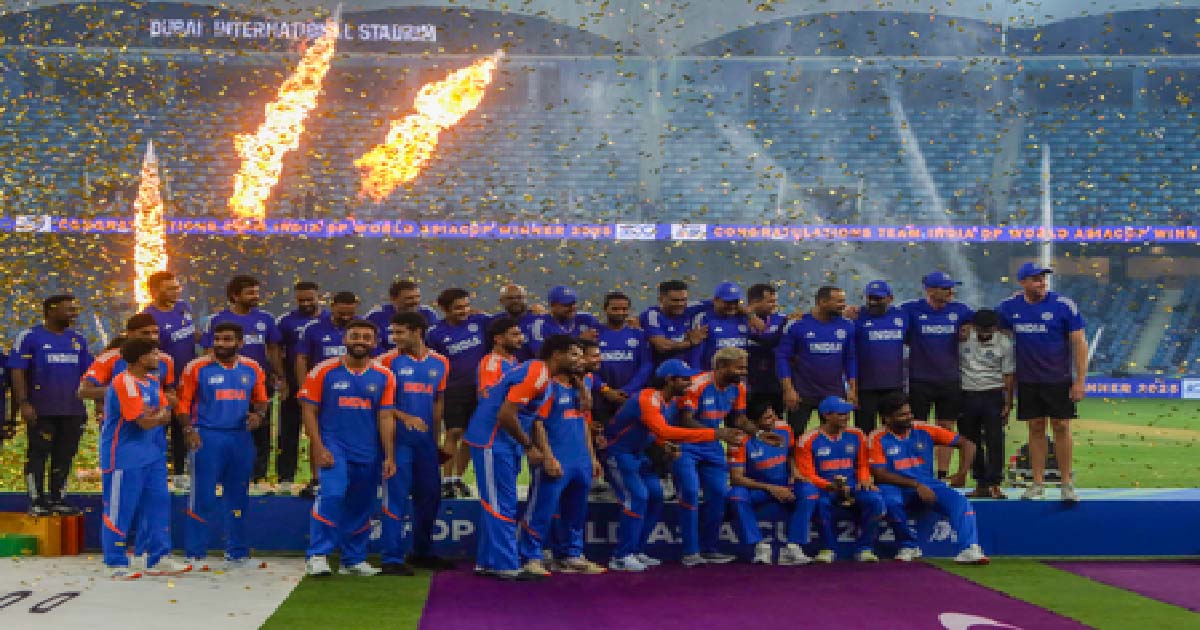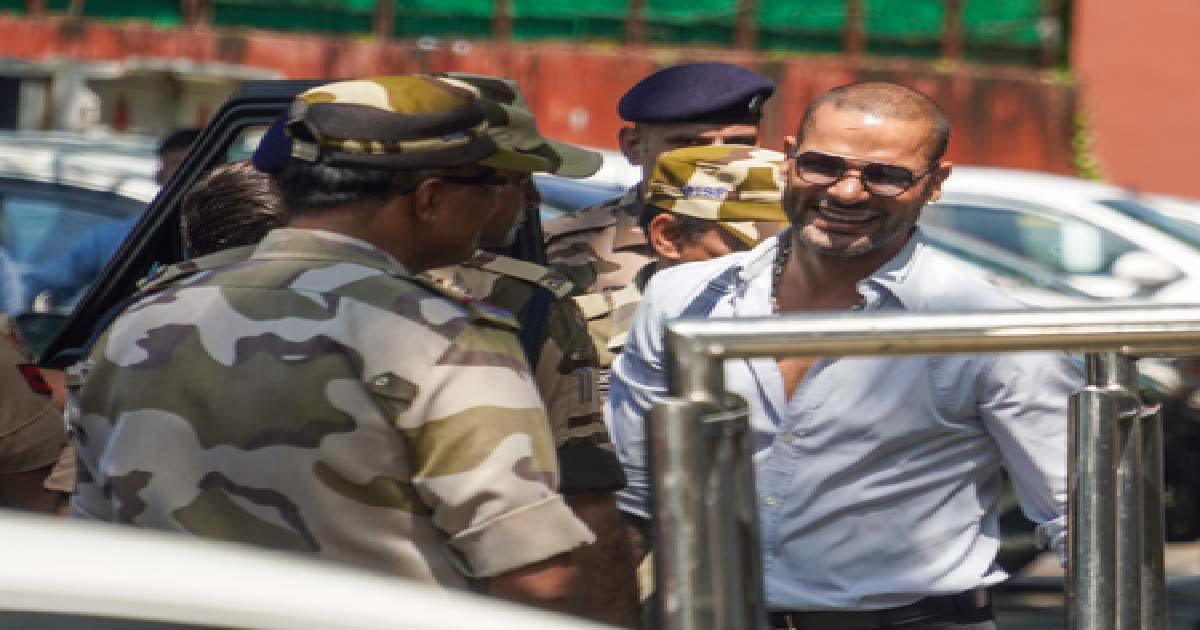Sports
Champions Trophy: Australia, South Africa chase semis spot in Rawalpindi

Rawalpindi (Pakistan), Feb 24: The reigning World Champions Australia will lock horns with South Africa in a highly-anticipated clash in the Champions Trophy 2025 at the Rawalpindi Cricket Stadium on Tuesday. With both teams securing dominant wins in their opening matches, the contest promises to be a crucial battle in shaping the Group B standings.
Australia announced their intent early in the tournament with a thrilling chase against England, overhauling a daunting 352-run target in Lahore to win by five wickets. South Africa, on the other hand, flexed their muscles against Afghanistan in Karachi, cruising to a comprehensive 107-run victory. With momentum on their side, both teams will look to consolidate their position in the race for the semi-finals.
Australia might be without several members of their 2023 World Cup-winning squad, but their opening performance showed they remain a force to be reckoned with. Skipper Pat Cummins, alongside pace spearheads Josh Hazlewood and Mitchell Starc, is missing from the tournament due to injuries or personal reasons, while the shock retirement of Marcus Stoinis has further thinned their all-round options.
Despite these setbacks, Australia found match-winners in their first game, with wicketkeeper-batter Josh Inglis leading the charge with a superb century.
Veteran Steve Smith will be key at the top, especially with Marnus Labuschagne holding the middle order together. The Rawalpindi pitch is expected to favour stroke-makers, making it an ideal setting for Australia’s aggressive approach. With the ball, Ben Dwarshuis impressed on his debut against England and could once again be pivotal in the absence of seasoned pacers.
South Africa’s dominant display against Afghanistan underlined their title credentials, with Ryan Rickelton emerging as the standout performer.
The young opener not only struck a century but also kept wickets in the absence of Heinrich Klaasen, who remains a doubtful starter for this game due to an elbow injury. Should Klaasen be unavailable, Rickelton will again be tasked with dual responsibilities.
Rawalpindi’s surface is historically a paradise for batters, with good bounce and pace early in the innings. However, as the match wears on, spinners could find some assistance, making middle-over battles crucial.
Dew might be a factor under lights, which could tempt the captain to win the toss to bowl first and take advantage of improved chasing conditions later in the game.
Recent ODI matches at the venue have seen high scores and successful chases, adding an extra layer of intrigue to the contest.
Australia and South Africa share a fierce rivalry in the 50-over format, with the Proteas holding a slight edge in their ODI battles. In 110 matches between the two sides, South Africa have won 55, while Australia have emerged victorious on 51 occasions. Three matches have ended in ties, and one had no result.
When: February 25, Tuesday
Where: Rawalpindi Cricket Stadium
Time: The match is scheduled to begin at 2:30 pm IST while the toss will take place at 2 pm.
Broadcast details: The match will be broadcast on Star Sports Network.
Live Streaming: The match will be live-streamed on JioHotstar.
Squads:
Australia: Steve Smith (c), Sean Abbott, Alex Carey, Ben Dwarshuis, Nathan Ellis, Jake Fraser-McGurk, Aaron Hardie, Travis Head, Josh Inglis, Spencer Johnson, Marnus Labuschagne, Glenn Maxwell, Tanveer Sangha, Matthew Short, Adam Zampa.
Travelling reserve: Cooper Connolly.
South Africa: Temba Bavuma (c), Tony de Zorzi, Marco Jansen, Heinrich Klaasen, Keshav Maharaj, Aiden Markram, David Miller, Wiaan Mulder, Lungi Ngidi, Kagiso Rabada, Ryan Rickelton, Tabraiz Shamsi, Tristan Stubbs, Rassie van der Dussen, Corbin Bosch.
Travelling reserve: Kwena Maphaka
National News
Had a discussion with Naqvi, trying to bring Asia Cup trophy home at the earliest, says Saikia

New Delhi, Nov 8: BCCI secretary Devajit Saikia confirmed that he held a cordial discussion with PCB chairman Mohsin Naqvi on the sidelines of the ICC Board meeting held in Dubai on Friday, adding that there’s been willingness from both sides to break the stalemate over the Asia Cup trophy at the earliest.
The ongoing standoff over the Asia Cup 2025 trophy comes after India, led by Suryakumar Yadav, defeated Salman Agha’s Pakistan side by five wickets at the Dubai International Stadium to secure their ninth Asia Cup title.
But the post-match celebrations took an unbelievable turn when the Indian team opted not to accept the trophy or winner’s medals from Naqvi, the ACC Chairman who also serves as Pakistan’s Interior Minister and Chairman of the Pakistan Cricket Board (PCB).
“Yesterday, there were two meetings of the ICC. One is the formal board meeting and the other is the informal board meeting. There were two meetings and in both the meetings, I and the chairperson of PCB, Mohsin Naqvi were present.”
“But as it (the Asia Cup trophy issue) was not on the agenda of the ICC’s meeting, we made a request and the ICC facilitated a meeting between me and Naqvi on the sidelines of the board meeting.”
“We had a long meeting for about an hour and at the initiative of one of the very senior ICC board members, who’s a very senior person. So, they facilitated the conversation, and then the discussion between India and Pakistan happened yesterday at the ICC’s meeting place.”
“Mohsin Naqvi and I had a cordial discussion and we are trying to solve this problem. He will also be giving us some options, and we will also be giving up some options so that the stalemate can be broken at the earliest possible time,” said Saikia to Media on Saturday.
Before leaving for the ICC quarterly meeting in Dubai, Saikia had told Media about raising the grievance around the delay in the Asia Cup trophy handover despite a letter being sent to the continental body. It remains to be seen if a solution to the trophy handover issue comes in the next few days.
There were certain reports suggesting that a committee might be constituted to resolve the Asia Cup trophy impasse. Saikia, however, dismissed the speculation, stating that no such committee had been formed.
“That is totally incorrect news which is going on in the media. There is no truth in that news material. This is speculated news from some corners; I have no idea of this. But it is also news to me because it had not happened in that manner in the ICC’s meeting. I can assure you that,” he added.
Crime
ED attaches Rs 11.14 crore assets of Suresh Raina and Shikhar Dhawan in 1xBet case

New Delhi, Nov 6: The Enforcement Directorate (ED) has provisionally attached movable and immovable assets worth Rs 11.14 crore belonging to former Indian cricketers Suresh Raina and Shikhar Dhawan under the Prevention of Money Laundering Act (PMLA), 2002, in connection with its ongoing probe into the illegal offshore betting platform 1xBet, the agency said on Thursday.
According to the ED, the attachment includes mutual fund investments worth Rs 6.64 crore held in Raina’s name and an immovable property valued at Rs 4.5 crore belonging to Dhawan.
The action stems from multiple FIRs registered by various state police agencies against the operators of 1xBet and its surrogate brands – 1xBat and 1xBat Sporting Lines – accused of promoting and facilitating unlawful online betting and gambling operations across India.
“Investigation revealed that both Suresh Raina and Shikhar Dhawan knowingly entered into endorsement agreements with foreign entities for the promotion of 1xBet through its surrogates,” the ED said in its press note.
“These endorsements were made in return for payments routed through foreign entities to conceal the illicit origin of the funds, which are linked to proceeds of crime generated from illegal betting activities,” it added.
ED officials further found that 1xBet operated without authorisation in India, targeting users through social media, online videos, and print advertisements. To disguise the source of funds, payments were layered through multiple entities and foreign accounts.
During the investigation, the agency uncovered a laundering trail exceeding Rs1,000 crore. It was found that over 6,000 “mule” bank accounts were used to collect money from Indian bettors, routed through several payment gateways.
Many merchants on these platforms were onboarded without proper KYC verification, and their declared business activities did not match transaction patterns.
Searches were conducted at four payment gateways, leading to the seizure of incriminating evidence. Over 60 bank accounts linked to the operation have been frozen, with funds exceeding Rs 4 crore blocked so far.
Issuing a public advisory, the ED urged citizens to refrain from engaging in or promoting online betting and gambling platforms, warning that aiding such activities may lead to prosecution under PMLA, which carries imprisonment of up to seven years and attachment of assets derived from illegal proceeds.
Further investigation into the case is underway.
Sports
4th T20I: Australia make four changes, elect to bowl first against unchanged India

SPORT
Carrara (Gold Coast), Nov 6: Australia have won the toss and elected to bowl first against India in the fourth T20I at the Carrara Oval on Thursday. The five-game series is poised at 1-1 and a win for either of the two teams will ensure they are ahead in their quest to eventually claim the trophy.
After winning the toss, Australia skipper Mitchell Marsh said Adam Zampa, Glenn Maxwell, Josh Phillipe and Ben Dwarshius come in as the four changes due to first-choice players like Travis Head and Sean Abbott going to play Sheffield Shield in preparation for the Ashes.
“We don’t play a lot here. It is great to be here, will try to get as much information about the surface as we can. It is great, five-match series going down to the last two games, both teams will be pumped,” he said.
India captain Suryakumar Yadav said his playing eleven is unchanged, in what is also the side’s first time of playing an international game in Gold Coast. “This is what you play bilaterals for, you challenge yourself and it is a beautiful stadium, everything to play for. The preparation has been good.
“We had a day off, had a good practice session yesterday. It looks like a subcontinent wicket, later on it might get slower, so we are happy to bat first. We were looking to bat first. Looks similar to Indian conditions, put runs on the board and we want to take up that challenge,” he said.
Playing XIs
India: Abhishek Sharma, Shubman Gill, Suryakumar Yadav (captain), Tilak Varma, Axar Patel, Washington Sundar, Jitesh Sharma (wk), Shivam Dube, Arshdeep Singh, Varun Chakaravarthy, and Jasprit Bumrah
Australia: Mitchell Marsh (captain), Matthew Short, Josh Inglis (wk), Tim David, Josh Philippe, Marcus Stoinis, Glenn Maxwell, Ben Dwarshuis, Xavier Bartlett, Nathan Ellis, and Adam Zampa
-

 Crime3 years ago
Crime3 years agoClass 10 student jumps to death in Jaipur
-

 Maharashtra1 year ago
Maharashtra1 year agoMumbai Local Train Update: Central Railway’s New Timetable Comes Into Effect; Check Full List Of Revised Timings & Stations
-

 Maharashtra1 year ago
Maharashtra1 year agoMumbai To Go Toll-Free Tonight! Maharashtra Govt Announces Complete Toll Waiver For Light Motor Vehicles At All 5 Entry Points Of City
-

 Maharashtra1 year ago
Maharashtra1 year agoFalse photo of Imtiaz Jaleel’s rally, exposing the fooling conspiracy
-

 National News1 year ago
National News1 year agoMinistry of Railways rolls out Special Drive 4.0 with focus on digitisation, cleanliness, inclusiveness and grievance redressal
-

 Maharashtra12 months ago
Maharashtra12 months agoMaharashtra Elections 2024: Mumbai Metro & BEST Services Extended Till Midnight On Voting Day
-

 National News1 year ago
National News1 year agoJ&K: 4 Jawans Killed, 28 Injured After Bus Carrying BSF Personnel For Poll Duty Falls Into Gorge In Budgam; Terrifying Visuals Surface
-

 Crime1 year ago
Crime1 year agoBaba Siddique Murder: Mumbai Police Unable To Get Lawrence Bishnoi Custody Due To Home Ministry Order, Says Report












